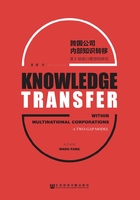
1.3 Significance of the Research
“Knowledge is power” is a famous motto for everyone in this world. Recently,it has sparked new interest integrating modern society with information age. As a strategic resource,knowledge has brought the issue of knowledge transfer within organizational units into the forefront of strategic management,which is one of the key challenges in MNC management. For instance,the process of knowledge transfer between a MNC’s HQ and overseas subsidiaries can generate new knowledge,which can better serve clients and meet market demands. Consequently,knowledge can help MNCs improve their performance. The management of internal knowledge transfer has thus become a strategic issue within MNC boardrooms(Kogut and Zander,1993).
Although the importance of knowledge transfer is widely acknowledged,there are limited empirical works which attempt to integrate hypotheses about internal knowledge transfer and address how such transfer reduce the knowledge gap between HQ and overseas subsidiaries. We demonstrated that the research model suggested by Albino et al.(1998)has a comprehensive coverage of key elements and their relationships are suitable for our data analysis. A summary of factors is presented in Table 1-1.
Table 1-1 A summary of the literature on factors affecting knowledge transfer within a MNC

Table 1-1 A summary of the literature on factors affecting knowledge transfer within a MNC-Continued

A problem faced by the MNC knowledge transfer is knowledge gap between HQ and overseas subsidiaries. Actors need to offer motivational incentives to employee. Also,as the knowledge gap between senders and receivers may negatively affect transfer success,organizations must decide if the receivers have absorptive capacity which is including receiving,absorbing,and re-using the transferred knowledge. If the knowledge gap is big,a knowledge intermediary might be required.
Even though it contributes to knowledge transfer from advanced to laggard organizations,it influences knowledge transfer effectiveness. If the receivers’ knowledge level is too low,they may have difficulty to absorb the knowledge to be transferred directly. A good collaboration needs partners of equal strength,if one partner is too weak(or less developed),collaboration becomes help,which isn’t sustainable because it’s a one way operation. There is a substantial difference in the understanding of the terms used by HQ and overseas subsidiaries,which seriously affects cooperation in the process of knowledge transfer.
The gap between partners in terms of their different cultural background will influence the success of knowledge transfer. Culture is a critical dimension of transnational knowledge transfer. It’s important that all partners do understand culture distance from each other. In the MNC,cross-cultural teaching and learning is considered as a major knowledge transfer channel,because culture understanding enables effective knowledge transfer. Success of transnational organizations depends on the trust between staffs from different cultures. Trust is extremely important for knowledge exchange,it is the basis of any fruitful collaboration. Knowledge transfer won’t be possible without trust,because it need to establish a long-term partnership for overcoming problems and unforeseen obstacles. As the core of the MNC,partnership between HQ and overseas subsidiaries is the basis of promoting regional and multilateral networking. As a form of partnership,teamwork in the area is addressed by the project ensuring effective knowledge transfer and the future implementation of the know-how in the target areas. This factor may also show that the constitution of a partnership plays a stable role in the process of knowledge transfer.
The gap between partners in terms of their communication level will also influence the success of knowledge transfer. As the foundation of communication between partners,shared vision is a crucial factor in the process of knowledge transfer. It has been suggested in previous literature that shared vision encompasses many aspects of a cooperative relationship. The concept of shared vision is often used to refer to shared values and mutual goals and understanding in a cooperative relationship(Morgan and Hunt,1994). Shared values and understandings between parties in an exchange relationship facilitate meaning communication that is essential in both the exchange and combination required for knowledge transfer. MNC’s organization culture helps to build shared vision between HQ and overseas subsidiaries. It looks like more important than domestic corporations. That is because the communication between different countries is complicated. For example,language and information technology are key factors of the transfer media in the transnational knowledge transfer,actors should make sure that the partners agree and implement effective transfer channels. Although English is the major international language,partners from Asia countries did not seem to have a good command of English. This could cause communication problems,especially for virtual communications,and undermine their ability to obtain and transfer knowledge. So-called as the virtual communications,a variety of information technologies were used by MNC including international training and seminar;video-meeting;ICT system;B2B match-making,simple E-mail and so on.
This book attempts to identify and confirm these key factors in the domain of MNC’s KTA framework,in order to reduce knowledge gap between HQ and overseas subsidiaries. Based on the discussion of the knowledge transfer’s modes and management strategy combined with the latest research theories,we regard the MNC’s internal knowledge transfer as the research object. This book makes an analysis of the key factors of knowledge transfer,and puts forward some hypotheses for accelerating the knowledge transfer. Then,we draw sufficient support for these findings from an extensive data gathered through questionnaire survey undertaken by foreign subsidiaries located in Wuhan of China. The data-based findings of this empirical study provide strong support for the arguments made in this research. Finally,empirical analysis will be used to test the feasibility of these hypotheses. We hope make some good suggestions about MNCs managing and controlling their overseas subsidiaries and what roles and responsibilities the subsidiaries assume.